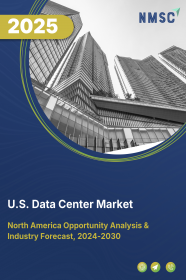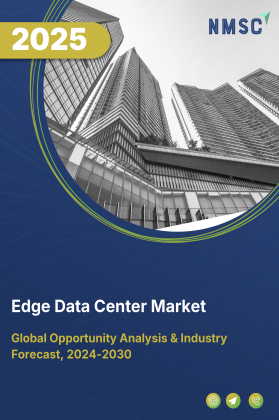
U.S. Data Center Market by Infrastructure (Hardware, Software, and Services), by Type (Enterprise Data Centers, and others), by Data Center Rating (Tier I, and others), by Size (Small Data Centers, and others), by Power Capacity (<0.01 GW, 0.01-0.05 GW, 0.05-0.1 GW, 0.1-0.5 GW, and >0.5 GW), by Server Rack Density (<10kW, and others), by Data Center Redundancy (N+1, and others), by PUE Outlook (Less than 1.2, and others), and Others - Opportunity Analysis and Industry Forecast, 2024–2030
Industry: ICT & Media | Publish Date: 04-Nov-2025 | No of Pages: 210 | No. of Tables: 166 | No. of Figures: 111 | Format: PDF | Report Code : IC2420
U.S. Data Center Market Overview
The U.S. Data Center Market size was valued at USD 103.27 billion in 2023, and is predicted to reach USD 158.55 billion by 2030, at a CAGR of 6.3% from 2024 to 2030. The data center market, also referred to as the network infrastructure market, encompasses the planning, construction, operation, and upkeep of specialized infrastructure dedicated to hosting computing systems. It comprises various components such as servers, storage systems, and networking gear, providing services such as cloud computing and connectivity solutions. Presently, the industry is witnessing widespread adoption of cloud services, alongside the emergence of edge computing to minimize latency.
Key trends include an emphasis on sustainability, heightened cybersecurity concerns, the integration of hybrid and multi-cloud approaches, and the influence of 5G networks. These trends underscore the industry's response to the growing demand for scalable, efficient, and secure data processing and storage solutions in the era of digital transformation. According to the United States International Trade Commission, the data processing and storage market is projected to expand from USD 56 billion in 2020 to USD 90 billion by 2025.
Soaring Electricity & Energy Demand Driven By AI, Domestic Manufacturing & Electrification
The U.S. Department of Energy (DOE), supported by research from Lawrence Berkeley National Laboratory, projects a steep rise in data center electricity consumption as AI, domestic manufacturing, and sector-wide electrification accelerate. Data center loads, which accounted for about 4.4% of national electricity use in 2023, are expected to climb to between 6.7% and 12% by 2028. This surge is directly tied to the deployment of GPU-intensive AI infrastructure, the rapid scaling of high-performance computing, and the broader demand from U.S. industrial and digital initiatives. The unprecedented growth trajectory is reshaping the national energy landscape, placing new pressure on utilities and transmission operators to expand capacity, upgrade interconnection systems, and strengthen grid reliability. As a result, energy demand linked to data centers has become not just a technology issue but a core infrastructure and national policy challenge, reinforcing the sector’s role as a structural driver of U.S. electricity markets.
Accelerated Infrastructure Policy Actions & Federal Initiatives Supporting Data Center Site Development
In parallel with rising demand, federal and state governments are actively reshaping policy to support the rapid deployment of data center infrastructure. Recent executive actions have directed federal agencies to make land available for AI and hyperscale campuses by 2027, reducing permitting bottlenecks and offering access to existing transmission and clean energy resources. The DOE has also begun mapping federal and national laboratory sites where high-voltage connections and energy infrastructure are already in place, enabling operators to significantly cut lead times for new projects. Grid planning assessments from the DOE indicate that up to 50 gigawatts of additional peak-hour supply will be required by 2030 as a direct consequence of data center expansion, making coordinated investment in power generation and transmission upgrades a national priority. These policy shifts signal a decisive move toward aligning regulatory frameworks, land use, and energy infrastructure development with the country’s strategic goal of maintaining leadership in AI, cloud computing, and advanced digital ecosystems.
Water Scarcity and Cooling Constraints in Arid Regions
The growth of hyperscale and AI-driven data centers is increasingly limited by water scarcity in drought-prone regions such as Arizona, Nevada, and parts of the West. Many facilities are located in areas already facing high water stress, creating competition with agricultural, municipal, and environmental needs. Localized surges in consumption have drawn attention from regulators and communities, prompting stricter oversight and, in some cases, restrictions on new projects.
To adapt, operators are adopting water-efficient cooling methods such as closed-loop and air-based systems or turning to non-potable water sources. These solutions, however, raise capital costs and extend project timelines. Regulatory pushback—such as city-level surcharges or outright project rejections—highlights how water availability and cooling constraints are becoming a critical barrier to the otherwise rapid expansion of the U.S. data center market.
Federal Sites & Clean Energy Campuses as Accelerated Deployment Pathways
A significant emerging opportunity is the U.S. government’s plan to leverage Department of Energy (DOE) lands to host AI-optimized data center and clean power campuses. In 2025, the DOE identified multiple potential sites on federal land — including locations such as Idaho National Laboratory and facilities in Kentucky and Ohio — that already have substantial energy infrastructure. These sites are being considered for streamlined permitting to accelerate the deployment of AI data centers and associated power generation, including nuclear, solar, and wind resources.
This initiative is reinforced by ongoing public investment in advanced energy and grid-edge innovation. The DOE has launched programs to fund high-performance cooling systems, microgrid integration, and grid-edge technologies to ensure reliable, resilient, and clean energy supply for the growing data center load.
Together, these developments provide a strong opportunity for data center operators who can partner with federal agencies, utilities, and renewable energy developers: building on existing land and infrastructure, accessing favorable permitting frameworks, integrating clean energy generation and storage, and reducing energy supply risks while advancing ESG and regulatory compliance goals.
Competitive Landscape
The key market players operating in the U.S. data center industry include Equinix, Inc., Digital Realty Trust, Inc., CyrusOne, Inc., CoreSite Realty Corporation, QTS Realty Trust, Inc., Iron Mountain Data Centers, Switch, Inc., NTT Global Data Centers, Cologix, Vantage Data Centers, Flexential, Inc., DataBank, Inc., TierPoint, LLC, EdgeConneX, Inc., STACK Infrastructure and others.
U.S. Data Center Market Key Segments
By Infrastructure
-
Hardware
-
IT Hardware
-
Servers
-
Storage Systems
-
Networking Equipment
-
-
Power Infrastructure Hardware
-
Uninterruptible Power Supplies (UPS)
-
Generators
-
Automatic Transfer Switches
-
Power Distribution Units (PDUs)
-
-
Mechanical Infrastructure Hardware
-
Computer-Room Air Conditioners (CRAC/CRA Units)
-
Chillers
-
Racks
-
Cable Management Systems
-
-
Safety & Security Hardware
-
Fire Suppression Systems
-
Physical Security Systems (CCTV, access controls)
-
-
-
Software
-
DCIM & Monitoring
-
Automation & Orchestration
-
Backup & Disaster Recovery
-
Security Software
-
Virtualization Software
-
Analytics & Reporting Software
-
Other Software
-
-
Services
-
Planning & Professional Services
-
Site & Building Design
-
System/Infrastructure Engineering
-
Professional Advisory (compliance, energy audits)
-
-
Integration & Deployment Services
-
Electrical & Mechanical Installation
-
Commissioning & Acceptance Testing
-
-
Operation & Support Services
-
Preventive & Corrective Maintenance
-
Facilities Management / Remote Monitoring
-
Support Services (helpdesk, onsite SLA support)
-
-
Hosting & Managed Services
-
Colocation & Cloud Hosting Services
-
Virtual/Private Hosting Platforms
-
-
By Type
-
Enterprise Data Centers
-
Colocation Data Centers
-
Cloud Data Centers
-
Hyperscale Data Centers
-
Edge Data Centers
-
Micro Data Centers
-
Others
By Data Center Rating
-
Tier I
-
Tier II
-
Tier III
-
Tier IV
By Size
-
Small Data Centers
-
Med-sized Data Centers
-
Large Data Centers
By Power Capacity
-
<0.01 GW (Small)
-
0.01-0.05 GW (Medium)
-
0.05-0.1 GW (Large)
-
0.1-0.5 GW (Hyperscale)
-
>0.5 GW (Mega-campus)
By Server Rack Density
-
<10kW
-
10-19kW
-
20-29kW
-
30-39kW
-
40-49kW
-
>50kW
By Data Center Redundancy
-
N (No Redundancy)
-
N+1 (Single-fault tolerant)
-
N+2 (Dual-fault tolerant)
-
2N (Full duplication)
-
2N+1 (Concurrently maintainable + extra spare)
-
3N/2N+2 (Multi-backup fault tolerant)
By PUE Outlook
-
Less than 1.2
-
1.2 - 1.5
-
1.5 - 2.0
-
Greater than 2.0
By Design Outlook
-
Traditional
-
Containerized
-
Modular
By End User
-
Cloud Service Provider
-
Technology Provider
-
Telecom
-
Healthcare
-
BFSI
-
Retail & E-commerce
-
Entertainment & Media
-
Government
-
Energy
-
Others
Key Players
-
Equinix, Inc.
-
Digital Realty Trust, Inc.
-
CyrusOne, Inc.
-
CoreSite Realty Corporation
-
QTS Realty Trust, Inc.
-
Iron Mountain Data Centers
-
Switch, Inc.
-
NTT Global Data Centers
-
Cologix
-
Vantage Data Centers
-
Flexential, Inc.
-
DataBank, Inc.
-
TierPoint, LLC
-
EdgeConneX, Inc.
-
STACK Infrastructure
Report Scope and Segmentation
|
Parameters |
Details |
|
Market Size in 2023 |
USD 103.27 Billion |
|
Revenue Forecast in 2030 |
USD 158.55 Billion |
|
Growth Rate |
CAGR of 6.3% from 2024 to 2030 |
|
Analysis Period |
2023–2030 |
|
Base Year Considered |
2023 |
|
Forecast Period |
2024–2030 |
|
Market Size Estimation |
Billion (USD) |
|
Growth Factors |
|
|
Companies Profiled |
15 |
|
Market Share |
Available for 10 companies |
|
Customization Scope |
Free customization (equivalent up to 80 working hours of analysts) after purchase. Addition or alteration to country, regional, and segment scope. |
|
Pricing and Purchase Options |
Avail customized purchase options to meet your exact research needs. |

















 Speak to Our Analyst
Speak to Our Analyst

























